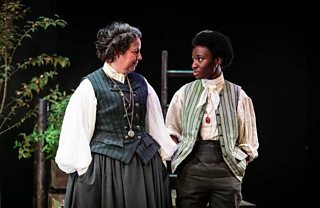All last week we announced the 69 writers who have been part of our five Voices development groups for 2022 across the UK.
But how do you become a 'Voice'?
We asked Katie Elin-Salt from the Welsh Voices to tell us about her writing journey to date and how that led to a place in the ±«Óãtv Writersroom Welsh Voices 2022.

The Welsh Voices 2022 - one of ±«Óãtv Writersroom's five Voices development groups around the UK.
I always say I started writing 5 years ago, but my Mum recently discovered a school report from Mrs Roberts (reception class teacher, 1993) that read “Katie’s stories are delightful and original". To date I’m yet to have a better review, so I think it’s safe to say I peaked at an early age and it’s just been a slow crawl back towards that level of praise ever since. I have definitely taken the scenic route back to the writing desk since my original debut in 1993, locking my own stories away safely and telling those of others whilst working as an actor on stage and screen for over a decade before realising I might have some things to say about the world too.
I think it took me so long because a) I was entirely terrified of being rubbish and being chased out of Soho by pitchfork wielding playwrights and b) because I had no idea about the writing process. I had always just assumed that what happened was that supremely clever and talented professional writers sat down in some sort of cottage in the Cotswolds for a weekend, channelled some sort of Aristotle-like muse and then came out with a ±«Óãtv commission.
It was only while working on a new writing season with in 2017 that I realised that actually the process from cottage to curtain up involved a whole load of useful things like redrafting, dramaturgy, script editing and conversations with clever people who can help carve out your messy blob of an idea of a story into an actual thing that people actually want to watch. Realising this, and reassuring myself that it was ok if I was a bit rubbish at first (because I’d literally never done it before) - I started putting tentative feelers out to the connections I’d made through my time as an actor, and from that I was fortunate enough to get some time and space in s’ new writers’ room (There was a ceremony, I cut a ribbon) and I wrote the first draft of my first play in a fortnight. 80% of it was rubbish, but 20% wasn’t entirely and so I found people that I thought could help me carve out the heart of the story within that 20% (I bought a lot of coffees for people whose work I admired and I got some clever friends round who I trusted to read it out loud and tell me about what they liked and what they didn’t) and then I started again on a clean page. 5 years later, I’m still carving out that particular story, but I’m learning that these things take as long as they take and in the meantime I’ve found loads of other ones to tell and also how to slowly build a career in writing.

Katie Elin-Salt performing as part of the Paines Plough Roundabout season in Black Mountain by Brad Birch: (Hasan Dixon and Katie Elin-Salt, Photo: Jonathan Keenan)
For me as a Welsh writer, companies like and championed me to write from the start and gave me the confidence to put pen to paper and feel like I might be heard on the other side. After conversations about how it all worked and how they supported new writers, I had the confidence to send off some work for scratch nights that they were holding, and saw my work performed for actual audiences out loud for the first time. I also booked onto a residential week that Dirty Protest were holding in writer’s centre, where the great Tim Price was to sit us all down and show us inside the structural matrix of how to tell an actual story. Unfortunately, I’d had a dodgy burger on the way up so I spent the next 48 hours alone in the attic room, with nothing but memories of other dark periods of life for company, like the time I spent my whole Christmas working as an elf in Santa’s Grotto in Westfields. Two days later I emerged to ask Tim to make me some dry toast and to listen to my idea about an elf called Sprinkles living through the worst Christmas ever. And that idea was eventually to become my first full play, developed, R+D-ed and eventually fully produced by Dirty Protest four years later.
After that I applied for every opportunity under the sun (keep your eyes on Twitter), waded through endless rejection emails and eventually found the precious few successful ones for writing schemes such as group and . These schemes gave me tools, a community, professional connections and most importantly the confidence I’ve needed to call myself a theatre writer, to write things and to know what to do and who to call to get better at it. In March 2020 I was thrilled to secure a writing residency at , travelling up for a stay in the beautiful , where I was to spend my time wandering the gardens, reading old books and writing my masterpiece. A day later I sat in a very sad full-staff meeting where Tamara Harvey gently explained that we were shutting up shop for the foreseeable, and off we all went head first into the pandemic.
Like many creatives, I was heartbroken and bewildered - but I didn’t stop writing. I applied for and then wrote a commission for the ’s online series, for ’ Signal Fires piece, I continued to work on the idea I was developing with Theatr Clwyd and I also applied for the ±«Óãtv Wales Writer in Residence scheme. Unbelievably, I was longlisted and then shortlisted for that - pipped to the post by the brilliant Faebian Averies, but making my first connection with Helen Perry and the team at ±«Óãtv Writersroom and ±«Óãtv Wales and encouraged to continue applying, I reached interview stage for the ±«Óãtv Writersroom Open Call 2021, and from that was encouraged to apply for the ±«Óãtv Welsh Voices scheme, which I was thrilled to secure a place on at the start of this year.
As part of the ±«Óãtv Writersroom Voices, in our regional cohorts it was great to have time to share and explore work together, to read each other's work and to have the time to have conversations about it all with Helen Perry and Emily Angell facilitating to make sure we all stayed on task! We also got to meet local production companies and make new professional connections, which I hope we will be able to draw on in the future. When the five Voices groups across the UK all joined together we were lucky enough to have masterclasses with writers and producers who spoke to us honestly about their journeys and how they worked. I also really enjoyed our session with , the chair of the Writer's Guild - who spoke to us about the work of the union and what we should and should not expect as professional writers moving forward. All of these experiences on both a regional and nationwide level provided a really in depth insight into the craft of carving out and sustaining a career as a screenwriter, and the practical/professional tools we might need to find our feet.

Celebrated Virgins by Katie Elin-Salt (Victoria John and Heather Agyepong at Theatr Clwyd)
In 2022 the idea developed in my Theatr Clwyd residency became my first commissioned play Celebrated Virgins which ran at The Mix, Clwyd and in , Cardiff last month - and I’m also just now coming to the end of my time with Welsh Voices.
What’s been really validating for me about the experience of starting my journey with the ±«Óãtv on the Voices scheme has been being given the permission and the space to say I know absolutely nothing about writing for TV. Of course I don’t, I’ve never done it before, Nigella Lawson didn’t know how to scald milk before someone bought her a microwavé, but a lot of the time as a writer you kind of have to smile, nod and pretend that you know everything.
The ±«Óãtv team (especially Helen Perry, a brilliant and kind TV commissioner who I think has met this kind of glass-eyed writers’ panic before) have been incredibly generous at creating a safe space where we can learn together, making horrible mistakes, asking awkward questions and being vulnerable with people in the room who can help. It’s been a real learning curve, at times challenging and confronting, but being able to learn and have space and time with people at the top of their game sharing time and knowledge with us - has been so validating.
Again, through securing a place on a scheme like this I am walking out feeling like I know a little bit more about what I’m doing and how to do it, and who to call when I don’t, in this new world of screenwriting. I’ve also really loved virtually meeting the other ±«Óãtv UK schemes (apart from Welsh Voices being shamelessly robbed in the end of scheme quiz) and I feel I have made connections with a peer group at a similar level to myself, and I hope to continue to champion and celebrate each others’ successes moving forward.
I think my advice for those who are considering writing or making the move into screenwriting and applying for TV writing schemes would be - just start telling your stories and find the people who can help you to tell them. Don’t expect to be brilliant at first, but know that you can get better if you let the right people help you. Don’t expect to get onto all the schemes straight away, but know that you can if you keep going, keep trying, keep listening and most importantly -
KEEP WRITING!
